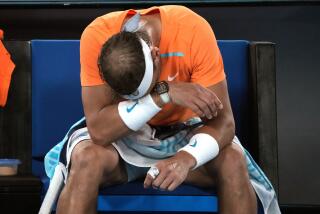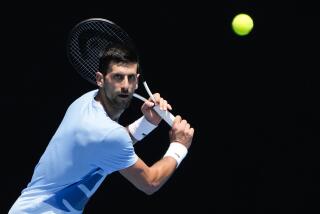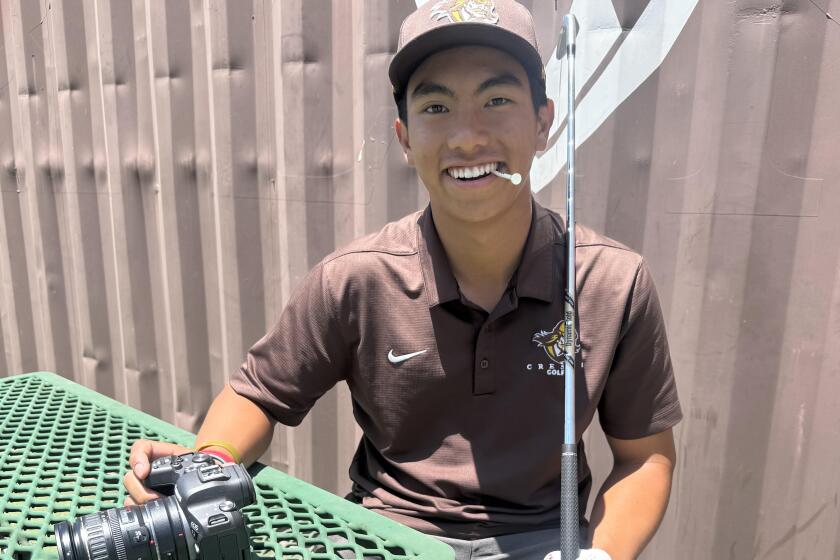Rios Bets On His Grit
- Share via
MELBOURNE, Australia — Not even the $412,000 winner’s check Marcelo Rios could pocket at the Australian Open on Sunday might cover his losses at blackjack the past two weeks.
Rios’ game is tennis, and if he sticks to it he can be rich and successful, perhaps one of the sport’s best players. Trouble is, blackjack is not the only way Rios has undermined himself.
The pony-tailed, 22-year-old Chilean, who plays 30-year-old Czech Petr Korda for the year’s first Grand Slam title, has a well-earned reputation for surliness off the court, and gutlessness on court.
In tennis terms, Rios was long considered a “tanker,” a guy who would give up a match when he was down, rather than fight back. His slogan could have been, “No mas!” He always had tremendous talent, even as a junior, but he played for years with a small heart.
“The last two years, I’m not being like that,” Rios said Friday after his 6-1, 6-3, 6-2 victory over unseeded Nicolas Escude in the semifinals. “Even if I’m losing badly, I try to fight to win a match. Before, I was a little lazy. If I’m losing, I say, OK, I concede. I didn’t fight and I lose matches easy, one and love, and it looks like I didn’t even care.”
Rios, the first Chilean to reach a Grand Slam final in the Open era and the first since Luis Ayala played for the French title in 1960, said he often didn’t care if he lost a match. And other players got on him for it.
“A lot of guys asked me, ‘Why are you tanking?’ or ‘Why don’t you fight?’ The more years you are on the tour, you realize that you can win matches even if you are losing,” he said.
“Some days I didn’t want to play. You wake up and you say, ‘I don’t want to play tennis. I don’t want to fight today.’ Sometimes I feel tired and I don’t want to play. But you have to do it.”
His attitude began to change last year in the French Open where he came back to win from 1-2 and 0-2 in sets in the first two rounds. He realized not only that he could do it, but that “you have to be professional 24 hours a day.”
Another key moment came when he played Michael Chang in the U.S. Open last September. Down two sets, Rios didn’t give up. Instead, he pushed it to five sets before losing.
“That was the turnaround in a best-of-five Grand Slam tennis match,” his coach, Larry Stefanki said. “When you see Michael Chang can be No. 2 in the world, and for quite a long time, why not Marcelo? In my mind, right now, he is No. 2.”
Stefanki, who had worked with John McEnroe, hooked up with Rios in 1995 after Rios’ agent came up to him and said, “This guy walks to a different drummer.”
“Marcelo and Johnny Mac have a good relationship now, but it took 10 months for it to grow,” Stefanki said.
Ranked No. 11 at the end of 1996, No. 10 at the end of last year, and No. 8 now, Rios began to make his mark as a Grand Slam threat when he reached the quarterfinals of the Australian and U.S. Open in 1997. In a major final now for the first time, he’s riding a wave of 11 straight match victories, including five at a tuneup he won in Auckland, the sixth title of his career.
“It’s exciting trying to win a slam,” he said. “If you lose the final, it’s not as good as saying, ‘I won a slam.’ ”
Yet even as he speaks, his flat voice, sleepy eyes and guarded manner reveal little emotion, as if he’s reluctant to let anyone know what’s going on inside him.
“He doesn’t have many close friends,” Stefanki said. “He’s a fun kid but quiet.
“He’s just starting to get confident. I tell, him, ‘Enjoy it and show it. You have a great smile.’ ”
Stefanki also has spoken to Rios about his attitude away from the court, telling him, ‘You can’t just blow by people like you do. This is not just about hitting a ball. There’s more to the job than that.’ ”
More to Read
Go beyond the scoreboard
Get the latest on L.A.'s teams in the daily Sports Report newsletter.
You may occasionally receive promotional content from the Los Angeles Times.










